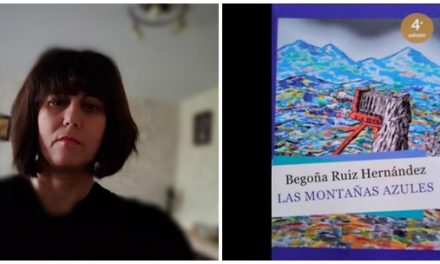Conocí a esta poeta norteamericana en 1981, cuando vino a dar la ponencia en la ceremonia de graduación en mi universidad que, en aquel momento, era de mujeres. No nos congratuló por nuestros títulos, sino que nos advirtió de lo mucho que nos tendríamos que afrontar en el mundo real que nos esperaba. Concluyó su discurso con estas palabras “Ladies, this editorial was written in 1864 under tremendous pressure. You are living in a world and going out into a world that has much more pressure. And yet, you can do it. You must do it. You must take responsibility for the time you take up and the state you occupy. Seize it, this world, as yours. Yours to change. Yours to increase. Yours to improve. You are phenomenal,”[1] y acabó recitando su poema “Phenomenal Woman.” A estas alturas, no recuerdo sus palabras – las cito – pero sí recuerdo lo mucho que me impresionaron, lo mucho que ella me inspiró a la hora de buscar la mujer fenomenal que llevaba dentro.
Nacida Marguerite Johnson en St. Louis, Missouri en 1928, Maya Angelou murió en Carolina del Norte en 2014. A lo largo de su vida fue cantante, bailarina, actriz, compositora y la primera directora de cine afroamericana de Hollywood, además de escritora, editora, guionista, poeta y activista (con Martin Luther King Jr. y Malcolm X). En 2000, Angelou recibió la National Medal of Arts del presidente Bill Clinton, para cuya inauguración presidencial escribió y recitó On the Pulse of Morning (un fragmento del cual reproduzco a continuación) y en 2010 recibió el mayor honor civil de Estados Unidos, la Presidential Medal of Freedom, de manos del presidente Barack Obama.
Hasta el momento, en España sólo existía la traducción, de Carlos Manzano, de su primer tomo autobiográfico, Yo sé por qué canta el pájaro enjaulado, pero ahora por fin hay una traducción, de Nieves García Pardos, de su Poesía completa, publicada este año por ed. Valparaiso. Para conocer sus datos biográficos, hay una página de Wikipedia en castellano, y una más amplia en inglés en la fantástica web de la Poetry Foundation, cuyos enlaces encontrarán al final de esta entrada.
He elegido cinco poemas que considero ofrecen una iniciación a la grandeza de la obra de esta mujer singular, además de tener cada uno un lugar en mi trayectoria poética íntima y personal. El primero, y quizás más famoso, se titula Caged Bird (Pájaro enjaulado) y antecede a su autobiografía I Know Why the Caged Bird Sings.
Traducción no oficial Pájaro enjaulado.
A free bird leaps
on the back of the wind
and floats downstream
till the current ends
and dips his wing
in the orange sun rays
and dares to claim the sky.
But a bird that stalks
down his narrow cage
can seldom see through
his bars of rage
his wings are clipped and
his feet are tied
so he opens his throat to sing.
The caged bird sings
with a fearful trill
of things unknown
but longed for still
and his tune is heard
on the distant hill
for the caged bird
sings of freedom.
The free bird thinks of another breeze
and the trade winds soft through the sighing trees
and the fat worms waiting on a dawn bright lawn
and he names the sky his own
But a caged bird stands on the grave of dreams
his shadow shouts on a nightmare scream
his wings are clipped and his feet are tied
so he opens his throat to sing.
The caged bird sings
with a fearful trill
of things unknown
but longed for still
and his tune is heard
on the distant hill
for the caged bird
sings of freedom.
Maya Angelou, “Caged Bird” from Shaker, Why Don’t You Sing? Copyright © 1983 by Maya Angelou. Used by permission of Random House, an imprint and division of Penguin Random House LLC. All rights reserved.
Source: The Complete Collected Poems of Maya Angelou (Random House Inc., 1994)
El segundo, Still I Rise, es mi poema favorito, y aquí dejo un video de ella recitándolo en inglés, junto con una traducción ‘guerrera’ que hice yo hace unos años.
You may write me down in history
With your bitter, twisted lies,
You may trod me in the very dirt
But still, like dust, I’ll rise.
Does my sassiness upset you?
Why are you beset with gloom?
’Cause I walk like I’ve got oil wells
Pumping in my living room.
Just like moons and like suns,
With the certainty of tides,
Just like hopes springing high,
Still I’ll rise.
Did you want to see me broken?
Bowed head and lowered eyes?
Shoulders falling down like teardrops,
Weakened by my soulful cries?
Does my haughtiness offend you?
Don’t you take it awful hard
’Cause I laugh like I’ve got gold mines
Diggin’ in my own backyard.
You may shoot me with your words,
You may cut me with your eyes,
You may kill me with your hatefulness,
But still, like air, I’ll rise.
Does my sexiness upset you?
Does it come as a surprise
That I dance like I’ve got diamonds
At the meeting of my thighs?
Out of the huts of history’s shame
I rise
Up from a past that’s rooted in pain
I rise
I’m a black ocean, leaping and wide,
Welling and swelling I bear in the tide.
Leaving behind nights of terror and fear
I rise
Into a daybreak that’s wondrously clear
I rise
Bringing the gifts that my ancestors gave,
I am the dream and the hope of the slave.
I rise
I rise
I rise.
Maya Angelou, «Still I Rise» from And Still I Rise: A Book of Poems. Copyright © 1978 by Maya Angelou. Used by permission of Random House, an imprint and division of Penguin Random House LLC. All rights reserved.
Source: The Complete Collected Poems of Maya Angelou (1994)
El tercero es un fragmento publicado en Poetry Foundation de su largo poema, encargado por Bill Clinton en su primera inauguración como presidente de los Estados Unidos, On the Pulse of Morning (el enlace es al poema entero en inglés).
A Rock, A River, A Tree
Hosts to species long since departed,
Marked the mastodon,
The dinosaur, who left dried tokens
Of their sojourn here
On our planet floor,
Any broad alarm of their hastening doom
Is lost in the gloom of dust and ages.
But today, the Rock cries out to us, clearly, forcefully,
Come, you may stand upon my
Back and face your distant destiny,
But seek no haven in my shadow,
I will give you no hiding place down here.
You, created only a little lower than
The angels, have crouched too long in
The bruising darkness
Have lain too long
Facedown in ignorance,
Your mouths spilling words
Armed for slaughter.
The Rock cries out to us today,
You may stand upon me,
But do not hide your face.
[…]
Maya Angelou, “On the Pulse of Morning” (excerpt) from On the Pulse of Morning. Copyright © 1993 by Maya Angelou. Used by permission of Random House, an imprint and division of Penguin Random House LLC. All rights reserved.
Source: The Complete Collected Poems of Maya Angelou (Random House Inc., 1994)
Incluyo el cuarto poema, Remembering, porque he encontrado su versión castellana en internet, y porque me encanta el título del libro del que procede: Just Give Me A Cool Drink Of Water ‘Fore I Diiie.
Soft grey ghosts crawl up my sleeve
to peer into my eyes
while I within deny their threats
and answer them with lies.
Mushlike memories perform
a ritual on my lips
I lie in mstolid hopelessness
and they lay my soul in strips.
(Enlace a la editorial Valparaiso)
Suaves fantasmas grises ascienden por mi manga
para mirarme de cerca a los ojos
mientras yo niego en mi interior sus amenazas
y les contesto con mentiras.
Los mullidos recuerdos representan
un ritual en mis labios
yo reposo en imperturbable desesperanza
y ellos dejan mi alma hecha girones.
El quinto y último poema es uno de los que me envió mi hija menor, estudiante universitaria en EEUU. Mientras estemos lejos la una de la otra, la poesía de Maya Angelou nos mantiene en contacto. Con The Telephone nos rinde homenaje a las mujeres que esperamos, remendando todo lo que hay a nuestro alcance, a que suene ese aparato que hace de carabina de nuestra vida, entre nuestras necesidades y nuestra necesidad.
The Telephone
It comes in black
and blue, indecisive
beige. In red and chaperons my life.
Sitting like a strict
and spinstered aunt
spiked between my needs
and need.
It tats the day, crocheting
other people’s lives
in neat arrangements,
ignoring me,
busy with the hemming
of strangers’ overlong affairs or
the darning of my
neighbors’ worn-out
dreams.
From Monday, the morning of the week,
through mid-times
noon and Sunday’s dying
light. It sits silent.
Its needle sound
does not transfix my ear
or draw my longing to
a close.
Ring. Damn you!
Source: The Complete Collected Poems of Maya Angelou (Random House Inc., 1994)
Enlaces de interés:
Sobre Maya Angelou: Wikipedia (en castellano); American Academy of Achievement (en inglés).
Sus poemas en inglés: Poetry Foundation ; Poem Hunter.
Kymm Coveney, febrero 2020








¡Preciosos!
Mi favorito es: «In and Out of Time».
Me encanta que hagan lucir a las mujeres poetas.
¡Saludos!